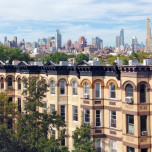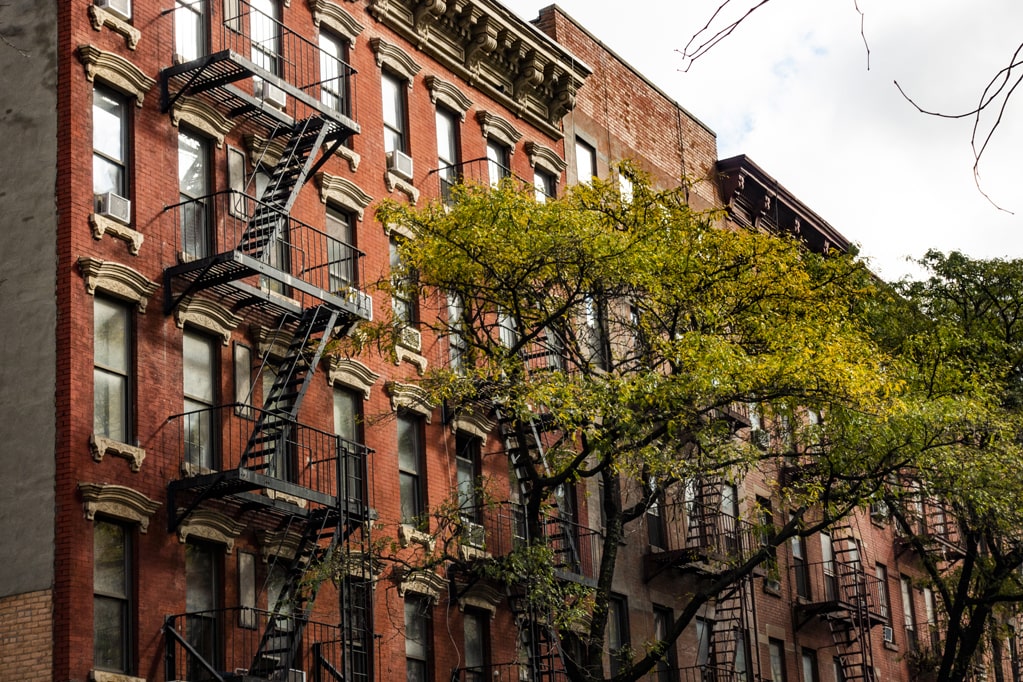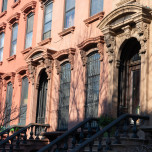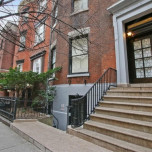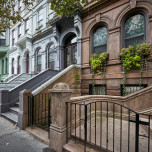
How To Buy An Apartment In New York City
Co-op, Condo,or Brownstone?

An overview
This guide to buying a co-op, condo, brownstone, or townhouse in New York City will help you navigate one of the most complicated and expensive real estate markets in the world. In Brick Underground's typical no-nonsense fashion, we take you through each step of the buying process, imparting insider tips and information that real estate agents may be reluctant or unable to share. Throughout this guide, you'll also find links to dozens of useful articles to further your understanding of the practicalities and nuances of buying real estate in New York City.
Now, onto step one: Determining whether you, your budget, your finances and your lifestyle are best suited for a co-op, condo, brownstone, or townhouse.
Ownership structure of co-ops versus condos
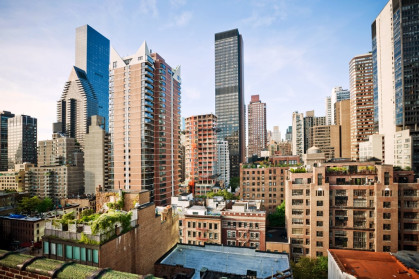
In a co-op (short for “cooperative”), the entire building is owned by a single corporation. Instead of a deed, you will receive shares (stock certificates) in the corporation, and a proprietary lease that allows you to occupy a specific unit and lays down the rules and rights much like a lease in a rental building. In fact, technically speaking, buyers of co-op apartments are referred to as “tenants” or “shareholders,” not “owners," and when legal issues arise, they are decided in accordance with landlord-tenant law, which typically gives co-op shareholders more protections than the laws that apply to condo owners.
Buying a condo is very much like buying a single-family townhouse. You get a deed to the apartment that gives you ownership of the interior of your unit and the surface of its walls, as well as an undivided interest in the building’s common elements. This is the type of ownership almost everyone has in mind when they think about buying a home.
After you buy your apartment, you will largely find that its legal ownership structure has little impact on your use of it. That said, there are a number of quirks related to each, discussed below.
The power of the board

In a co-op, shareholders elect a volunteer co-op board which (except in some very small buildings that choose to save money by self-managing) works with a property management company to oversee the care and maintenance of the building.
The board also creates and enforces rules about everything from renovation inside units, to what’s allowed to transpire on the roof deck, to whether you can speak on your cell phone in the lobby, or whether (and what kind of) dogs will be allowed in the building. Unlike condo boards, co-ops can even evict an extremely disruptive shareholder and force them to sell their apartment.
Overreaching, power-hungry co-op boards are the stuff of legend here, and some of the stories are true. However, at least as many co-op boards are made up of volunteers with full-time jobs and families who try to make the best of what is a demanding and time-consuming role when one well.
In a condo, individual owners elect a board of directors that perform many of the same functions as a co-op board. Generally speaking, though, most condo boards tend to be more hands-off when it comes to rulemaking.
That slightly more laissez-faire approach is partly due to philosophical underpinnings (more on that below) and partly because condo boards wield less legal enforcement muscle. Yes, the board can fine owners for the expense related to any rule infraction and get a court-ordered injunction to stop it from happening again. But because a condo owner actually owns his or her unit (versus shares in a co-op corporation), a condo board can’t evict an owner from an apartment like a co-op board can.
Note: In both co-op and condos, your voting power increases with the size of your apartment.
Cost comparison: Co-ops vs condos vs brownstones
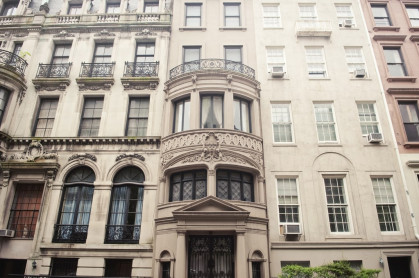
In New York City, co-ops outnumber condos, with around 70% of the city's housing stock comprised of co-ops. Older buildings (built pre-1980s) tend to be co-ops, while pretty much everything built from the 1980s onward is a condo.
Co-ops cost about 10% less, on average, than condos of similar location, size and amenities. Part of the reason is supply and demand: there are simply a lot more co-ops than condos. It’s also a lot easier to buy and sell a condo. Though condo boards may ask for as much financial information as a co-op board, a condo board can only reject a buyer by exercising its right of first refusal to buy the unit instead. Condo boards are also more investor-friendly than co-ops, which usually require that buyers use the apartment as their primary residence, and place more restrictions on the ability of residents to rent out their apartment.
On a per-square-foot basis, brownstones cost about the same as co-ops. Property taxes outside of Manhattan are typically much lower than co-ops or condos, but you’ll need to factor into your expenses the considerable repair and upkeep needed to keep your real estate in tip-top shape.
Minimum downpayment and asset requirements in co-ops vs condos

Most New York City co-ops require buyers to put down 20-25% of the purchase price, about the same as what most lenders require these days. But the range can be vast, depending on the co-op—anywhere from 10% down (rare) to 50% or more at higher-end buildings.
Co-ops also expect you to have sufficient money left over (also known as the ‘liquid asset’ requirement). Two years worth of mortgage and maintenance charges is about average though the amount can range drastically from building to building--from a few months worth of maintenance payments to 1 to 3 times the purchase price of the apartment. In addition, each co-op will expect you to meet a debt-to-income ratio, usually around 25%-29%. That means your total monthly payments--mortgage and maintenance--cannot exceed the specified percentage of your gross income. An excellent credit score is also required.
Don't be afraid of co-ops in NYC
"Co-ops are generally 10% less expensive than condos. Their rules are designed to protect the value of your apartment and ensure your neighbors are financially sound," says Matthew Steer of SteerKelly Team at Keller Williams. "As your broker, it's our job to make sure you qualify for the building you're interested in. We have a 99.9% success rate of getting buyers board-approved." Get in touch with us >>
Add them all up, and you will find that the average co-op's financial standards are much higher than the average mortgage bank...a primary reason NYC co-ops tend to withstand economic downturns well.
Condos typically require a 20% downpayment, and sometimes as little as 10%. Bear in mind, though, that if you’re getting a mortgage, banks these days often require 20%, unless the building qualifies for an FHA loan, which carries a 3.5% downpayment requirement, or you and the apartment qualify for a SONYMA loan, which has a 3% downpayment.
Many co-op and condo buildings require buyers with ‘borderline’ financial credentials to put an additional one to two years of common charges (condos) or maintenance payments (co-ops) into an escrow account as insurance against nonpayment. The odds of this happening to you increase along with the perceived riskiness of your application, as measured in debt-to-income ratio, U.S. citizenship status, or a variety of other factors. However, unintended legal consequences of New York’s 2019 rent reform laws may be ending this practice for co-ops (not condos). Instead, you may be asked to provide a guarantor.
Looking to buy a co-op apartment? National Cooperative Bank offers competitive rates and easy pre-qualification. With 40 years of lending to buyers in New York City, NCB is the bank for co-ops. After all, Cooperative is our middle name! Call us at (646) 201-4714 or email Brittney Baldwin at [email protected]. NMLS #507535. Equal Housing Lender.
Maintenance charges vs. common charges

In a co-op, shareholders pay a monthly maintenance fee. Part of it goes toward the expense of operating the building. The other part is the amount of property taxes apportioned to each shareholder based on the number of shares assigned to their apartment. Particularly these days, when property taxes and fuel costs are rising sharply, maintenance fees are frequently adjusted upward each year (3% to 7% annual increases are common).
In addition, co-op boards can require shareholders to contribute extra cash from time to time to boost the reserve fund or pay for a specific project. In a 40-unit building, for example, an assessment to replace an elevator might run $8,000-$15,000 per unit, depending on how many shares you own. Typically, shareholders can spread their payments out over a period of time such as 3 to 18 months.
In a condo, the monthly charges are referred to as common charges. Important: Property taxes are not included in the monthly common charge; individual owners are billed directly by the government. Keep this in mind when comparing carrying costs of co-ops to condos, because at first glance, condos may look cheaper on a monthly basis.
Like co-op boards, condo boards also levy assessments when necessary.
Monthly charges in both co-ops and condos tend to increase with the expansiveness of amenities and staff. However, larger buildings have economies of scale when it comes to staffing and operation that are often reflected in lower common charges.
Getting approved by a co-op or condo board

As a co-op buyer, you usually must be approved by a co-op board made up of your future neighbors That process involves a mountain of paperwork, a personal interview, the possibility of rejection, and the total (and totally one-sided) opening of your financial kimono to folks you will share the elevator with for years to come. Moreover, a co-op board can turn you down for any lawful reason. And because the reason need not be divulged, this means that in practice, unlawful reasons (race, religion, profession, sexual orientation, nationality, etc.) may also prompt a rejection. (Note: If you buy an apartment directly from the sponsor, you will not need board approval at all.)
Condo boards also subject buyers to nearly as much financial and personal scrutiny as co-ops do. But condo bylaws don’t permit the board to reject you. Instead of turning you down, a condo board’s only option is to exercise its “right of first refusal” and buy the apartment itself, which almost never happens. Instead, pretty much the worst that can happen to a condo buyer is that they wither away on the vine while a condo board engages in deliberate stalling tactics.
Sublet restrictions in a co-op vs condo
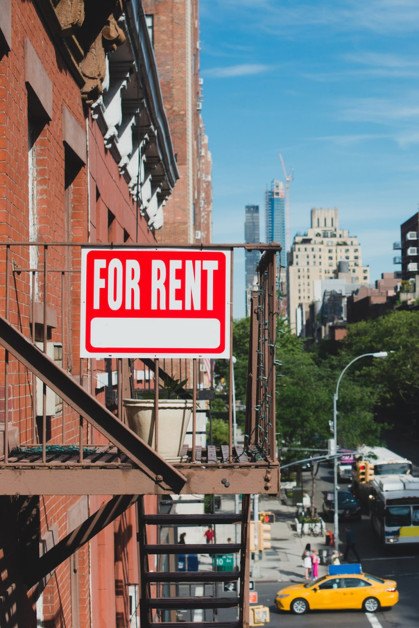
Most co-ops have very strict policies about subletting, which does not make them an ideal investment opportunity and can present a serious challenge if your job suddenly relocates to London, for instance. The rules vary, but owners are usually allowed to sublet their apartment for no longer than 1 to 2 years in any 5-7 year period. The board also gets to approve your tenant and charge you a fee for subletting.
Condo sublet policies are far more liberal. While there may be rules against short-term sublets (say, less than 6 months), there is usually no outside limit nor do boards have the right to turn down a tenant unless they exercise that right of first refusal and lease your apartment themselves. This makes condos ideal if you are looking to buy strictly for investment purposes and rent out your apartment year round. But just like a co-op, the application fees, move-in fees, processing fees, etc., can range from a few hundred to a couple of thousand dollars extra that you or your potential tenant will have to pay. And, if you do make a home in your condo, you will be living in a building with a more transient population than a co-op.
Will you be happier in a co-op--or a condo?

Brace yourself for some sweeping generalizations about lifestyle and other considerations in a New York City co-op versus condo. (Do your research to discover which of these statements actually applies to the building you’re considering.)
- Condo owners favor freedom and autonomy. Among other things, they don’t want to be told whether they can buy an apartment or to who they can sell or sublet it to; whether they can have a dog (or what kind, or the maximum it can weigh); whether they may refinance or take out a home equity loan, etc.
- Co-op owners are more worried about whether the living environment they think they are buying into will live up to their expectations—and they want to protect it.
- It can be difficult and more expensive to find condos in the most desirable areas such as Central Park West or the best parts of the West Village. Similarly, if you’re looking for prewar details, these buildings are almost always co-ops--and when you find a rare prewar condo, demand and prices are typically high.

For the reasons above, condos may be noisier and filled with a high turnover of renters who don’t care about getting along with the neighbors and may have a greater tendency to neglect the building. Co-ops, while often more peaceful and better tended, can be micromanaged, inbred, and change averse.

Newer condos tend to have more desirable amenities both inside the apartment (washer/dryers, anyone?) and outside (roof decks, playrooms, health-club-quality gyms, etc.) than co-ops and older condos. (That said, many co-ops have been retrofitting some amenities in order to stay competitive...often with mixed results.)
In addition to the generalizations above, you may want to focus your search on condos if:
- You have a large or feared breed of dog (basis for being rejected from a co-op even if it allows dogs and does not have a stated size or breed restriction)

- You are looking for a newer building
- You are an investor who wants to rent out your apartment
- You are buying using a trust or an LLC (though many co-ops have grown more tolerant in recent years)
- You want to use the apartment as a pied a terre
- You are buying the apartment for your kids
- You have sued a landlord or your last co-op or condo board, or you’re generally litigious (or you are an attorney)
- You’re a musician
- You have a home-based business that involves noise or lots of visitors like teaching music or practicing psychology
- You’re a foreign citizen
If you're not seeing enough homes for sale in your price range or target neighborhood—and/or you'd like to avoid a bidding war—consider expanding your search to "off-market" listings. NYC real estate brokerage The Agency, a Brick Underground partner, uses technology to mine public records and identify owners who may be ready to sell, meaning you can meet and deal with owners before their homes hit the market. Click here to learn more.
The pros and cons of buying a townhouse, rowhouse or brownstone
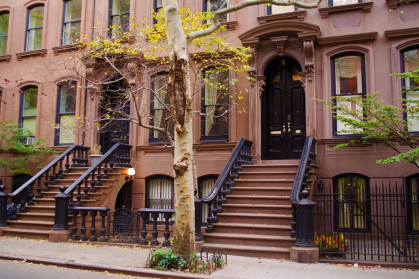
Variously known as townhouses, rowhouses or brownstones--classifications drawn largely from the material of their facades--these mostly attached single family homes are the quintessential, classic New York City charmer...and the most demanding piece of real estate you will ever own.
They also don’t come cheap: Plan on spending at least $2 million to $10 million (and up to 5 times that), with wider townhouses priced higher than narrow ones, and location (both the neighborhood and the block composition) playing an outsized role.
Pros:
- Privacy, privacy, privacy. Plus, you don’t have to worry about being too noisy.
- Private outdoor space (rear garden and often a roof deck)
- If your brownstone, townhouse or rowhouse has one or more legal rental units, you can offset your expenses by filling it with a tenant
- Single family homes are exempt from New York City’s short term rental laws--meaning you are free to Airbnb your place as you see fit.
- Lower property taxes than co-ops or condos; taxes in Brooklyn & Queens are particularly attractive
- The only approval you’ll need is from your mortgage bank (unless you’re paying all cash, and then all you need is money). You and your finances will not undergo the scrutiny of a co-op or condo board.
- More freedom to renovate as you please (no board approvals required), within the limits of building code and, if you’re in a historic district, the rules of the Landmarks Preservation Commission
Cons:
- Purchase price: Most buyers simply can’t afford them
- A very, very, very hands-on investment: With no doorman, super or porter, every household task falls on you (and your bank account)--from trash removal, to boiler maintenance, snow removal, receiving packages, replacing the roof, and much much more. If you have bandwidth and deep, elastic pockets, this may work for you. Stay away if you’re stretching to buy and need to keep your housing expenses predictable, with no ability to drop, say, $70,000 to fix a deteriorating facade.
- Elevators are rare, and three or more steep flights of stairs are common
- Layouts tend to be deep front-to-back, with no windows on the side, so interiors can be sunlight challenged
- Renovating tends to be much more involved, expensive, and lengthy....especially if your house is located in a historic district.




























